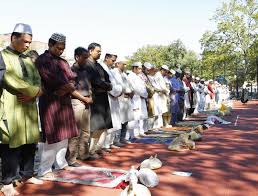
RNA - The imam, a Muslim prayer leader, lives on a busy road in Lanham, Maryland. To collect his mail, he must trek along the shoulder, a usually mundane trip, Azzaari said. However, when he does so dressed in imam attire — a loose tunic worn with a cap — cars have started swerving into his path to intimidate him, Azzaari said.
"It's happened with me quite a few times," Azzaari, imam and religious director of the Prince George's Muslim Association, said. "They can tell this is a Muslim leader. Some of them spit, some of them curse — and a few times, they try to hit me."
Now that Donald Trump has become the president-elect, Azzaari said, he expects incidents like these to increase in frequency. The Republican's comments over the past year have induced "escalating hostility and hatred against Muslims" across the country, an intensification felt even in typically tolerant Maryland, Azzaari said.
"(Trump's election) will increase discrimination, it will increase hateful actions, it will increase hatred," Azzaari said. "It will put Muslims in the corner more and more. We are expecting this."
As Trump prepares to take office, Maryland's Muslim community is bracing for an uncertain future. The Republican's support of a ban on Muslims entering the U.S., his opposition to Syrian refugees and his consideration of the re-launch of a registry of Muslim immigrants have induced feelings of fear and worry in many, which community leaders and advocates are working to quell.
"The Trump campaign engaged in hateful and bigoted rhetoric that targeted Muslim immigrants," said Robert McCaw, director of government affairs at the Council on American-Islamic Relations, a Washington-based Muslim civil rights organization. "There is a justifiable level of concern in the Muslim community."
On Monday, American Muslim leaders sent an open letter to Trump requesting he "reconsider and reject" those recently named to his administration with "a well-documented history of outright bigotry directed at Muslims or advocating that Muslims should not have the same rights as their fellow Americans."
Though the letter did not name any specific advisers or cabinet appointees, some of the imams, university chaplains, advocates and others who signed have previously expressed concern about those of Trump's selections who have publicly criticized Islam or support Muslim-targeted policies.
Among them is Stephen Bannon, whom Trump tapped as senior counselor.
Bannon is the former chief executive of Brietbart, a news and opinion website that, under his leadership, published articles critical of Muslim immigrants.
Though Trump campaign adviser Kellyanne Conway told the New York Times in November that Bannon was not a right-wing nationalist, his appointment has been lauded by leaders of the Ku Klux Klan, the American Nazi Party and other white nationalists.
Leaders are worried the nominations will spark a spike in hate crimes like those experienced by Azzaari, said Abed Ayoub, legal and policy director at the American-Arab Discrimination Committee, a Washington-based civil rights organization.
Citing a recent "outbreak" in hate crimes against racial and religious minorities (including Muslims), Maryland Attorney General Brian Frosh launched a hotline to report them just a week after the election. Since then, its operators have received about 30 calls, spokeswoman Raquel Coombs said.
The FBI recently reported a 67 percent rise in hate crimes nationwide against Muslims in 2015. The 2016 figures will not be available until next year.
"What stands out above anything else is the increase in the number of hate crimes, and that's a real concern for us and for the community," said Ayoub. "Individuals are being harassed, being threatened, being hit. That's what our focus is on, how to combat these."
In the 10 days following the election, 867 hate crimes were reported nationwide to the Southern Poverty Law Center or in media accounts, according to the Southern Poverty Law Center. Of these, 22 took place in Maryland.
Thirty-two percent of hate crimes nationally were "motivated by anti-immigrant sentiment"; 6 percent involved Muslims, according to the center.
"CAIR is deeply concerned about the ongoing pattern of President-elect Donald Trump nominating as advisers individuals with Islamophobic, xenophobic or racist viewpoints," McCaw said. "The question is how it will impact the nation's policy moving forward."
Much uncertainty exists over what direction Trump will take on national security and immigration policy, McCaw said. Before his inauguration in January, it will be difficult to predict what measures he will and will not implement.
Until then, the Muslim community is bating its breath. Community leaders and advocates are taking steps to assuage the fears of their fellow Muslims — particularly immigrants — through education on their rights.
847/940